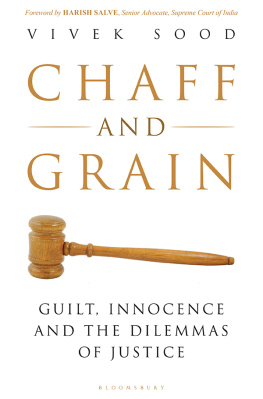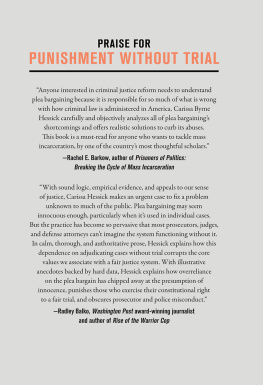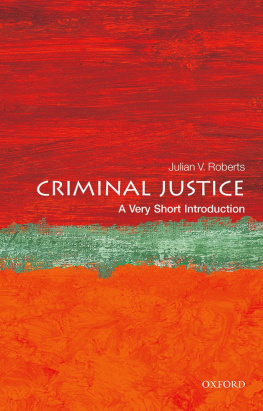
CHAFF AND GRAIN
CHAFF AND GRAIN
Crime, Innocence And the Dilemmas of Justice
Vivek Sood

BLOOMSBURY INDIA
Bloomsbury Publishing India Pvt. Ltd
Second Floor, LSC Building No. 4, DDA Complex, Pocket C 6 & 7,
Vasant Kunj, New Delhi, 110070
BLOOMSBURY, BLOOMSBURY INDIA and the Diana logo are trademarks of Bloomsbury Publishing Plc
First published in India 2023
This edition published 2023
Copyright Vivek Sood, 2023
Vivek Sood has asserted his right under the Indian Copyright Act to be identified as the Author of this work
All rights reserved. No part of this publication may be reproduced or transmitted in any form or by any means, electronic or mechanical, including photocopying, recording or any information storage or retrieval system, without the prior permission in writing from the publishers
This book is solely the responsibility of the author and the publisher has had no role in the creation of the content and does not have responsibility for anything defamatory or libellous or objectionable
Bloomsbury Publishing Plc does not have any control over, or responsibility for, any third-party websites referred to or in this book. All internet addresses given in this book were correct at the time of going to press. The author and publisher regret any inconvenience caused if addresses have changed or sites have ceased to exist, but can accept no responsibility for any such changes
ISBN: HB: 978-93-54353-56-7; eBook: 978-93-54356-81-0
Created by Manipal Technologies Limited
To find out more about our authors and books visit www.bloomsbury.com and sign up for our newsletters
To Ramayni, my lovely daughter
She is a constant motivation for me to excel in my endeavours
Without her inspiration, this book would not
have seen the light of day
CONTENTS
Democracy was sired by the tyrannies of the monarchy. One of the vicious features of monarchy was the abuse of power through incarceration and death. From the Star Chamber under Charles I to the guillotine of the French Revolution, the dungeons with their chains have been used by despots over the centuries until the human race set about to institutionalise human freedom.
A core value of any democracy is the rule of law. Translated into criminal jurisprudence, this mandates a fair investigation and an impartial trial. The presumption of innocence, founded on the belief that it is better to let go of a dozen guilty persons rather than convict an innocent one, grew out of this revulsion against tyranny.
Modern society with its growing institutions has seen a different kind of despotism that stems from power without real accountability. Elected representatives of the people, with their control over the police, have successfully distorted the criminal justice system to make it into a weapon to be wielded against the weak or political foes and to shield friends and family.
The invasion of our living rooms by the small screen with the explosion of news channels competing to break news has led the anchors to realise the use of the criminal justice system for their evening forays.
The growing disillusionment with the status quo has had its backlash, and the criminal justice system, consistent with the consumerist mindset, has set about seeking instant gratification. So first we break the news of a crime and then seek immediate retribution. Pre-trial arrest and incarceration are seen as just punishment for those convicted by news channels and newspapers.
The menace of terrorism and the Robin Hood form of justice against alleged economic crimes have persuaded the judiciary to reverse its view of civil libertiesjail, not bail has sometimes appeared to be the new mantra.
The judgement of the Supreme Court in the money laundering act may be right or wrong, but what cannot be denied is that it sent shivers down the spine of liberals. The schedule of the money laundering act shows a broad characterisation of predicate offences, and even regulatory breaches could see arrests without bail.
As a lawyer, even I find myself at a loss to explain the architecture of the criminal justice system, the proverbial common man is at a complete loss to understand what is going on!
In this scenario, a book that attempts to explain notions of guilt and innocence as perceived in current times, and the dilemma of the modern criminal justice system, is a commendable attempt at trying to demystify the subject.
Judgements of the Supreme Court have, as is inevitable, wavered from the strict to the liberal in matters as vital as the granting of pre-trial bail.
With increasing complexity in investigating and proving crime, the shift from the overbroad no innocent should ever be punished syndrome, which gave the benefit of the doubt when perhaps none was deserved, was inevitable and that is yet another complex issue addressed in this text.
In an act of courage, the author has squarely addressed social media abuse. Social media has empowered us by making available a means of having our voices heard. It equally has allowed each one of us to vilify all and sundry, mostly with careless disregard for the truth. A WhatsApp forward is viewed with the same sanctity as the gospel. Balancing free speech with the equally important right of privacy and protection of reputation is always going to be legal work in progress. And the newly discovered torture device of the colonial pastseditionhas been polished painted and put to use by politicians who are hypersensitive to criticism. The notion of sedition and its incompatibility with the contemporary notions of rule of law find a place in this book.
This book, written in language that makes for easy reading, is a must-read for those who want to make sense of what is going on and to identify areas of strength and weakness in the criminal justice system. Democracy lives in the hearts of its citizens and perishes when we take it for granted. The rule of law is to democracy what the heart is to the human body and the criminal justice system is at its core. We owe it to ourselves and to generations that would follow to fix what has gone wrong and to strengthen what is right, and this book is a must-read for those who are ready and willing to engage in this task. I wish the book all success.
Harish Salve
Senior advocate, Supreme Court of India
The criminal justice system has always evoked immense interest amongst people from all walks of life. The media is full of criminal cases and people are always eager to discuss and comment on cases, arrests, bail, police excesses and investigations. As I am a criminal defence counsel, I have often been quizzed about my views on criminal cases on various platforms. This keen interest among the general public was one of the motivating factors to write this book.
Another significant reason is that in 2022 I completed three decades in the legal profession and having been engaged as a defence counsel in thousands of cases, I have developed my perspectives on the criminal justice system. This book is a result of my views, thoughts and critique of the various aspects of the criminal justice system in India.
The final reason for writing this book is that I have not found a publication that deals with the burning issues that plague the Indian criminal justice system. The issues that I chose to write about are a result of my three decades of experience at the criminal side Bar. My experience has enabled me to develop deep insights into the problems that confront the criminal justice system; hence I took up this subject. I also believe this work could become a medium to convey to the judiciary, legislature and law enforcement agencies about the imperative reforms that are needed to rid our criminal justice system of maladies and ills. In this book, I have dealt with seven topics of critical significance with respect to the Indian criminal justice system.
Next page







